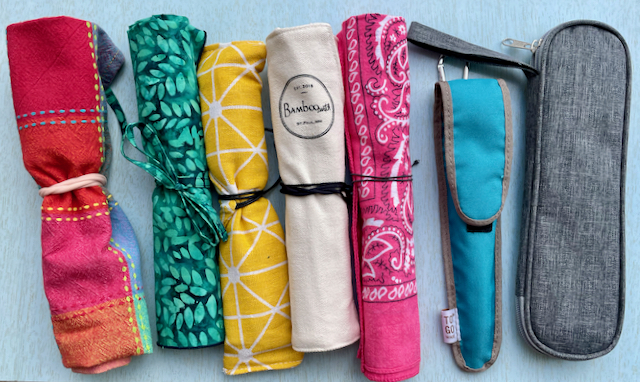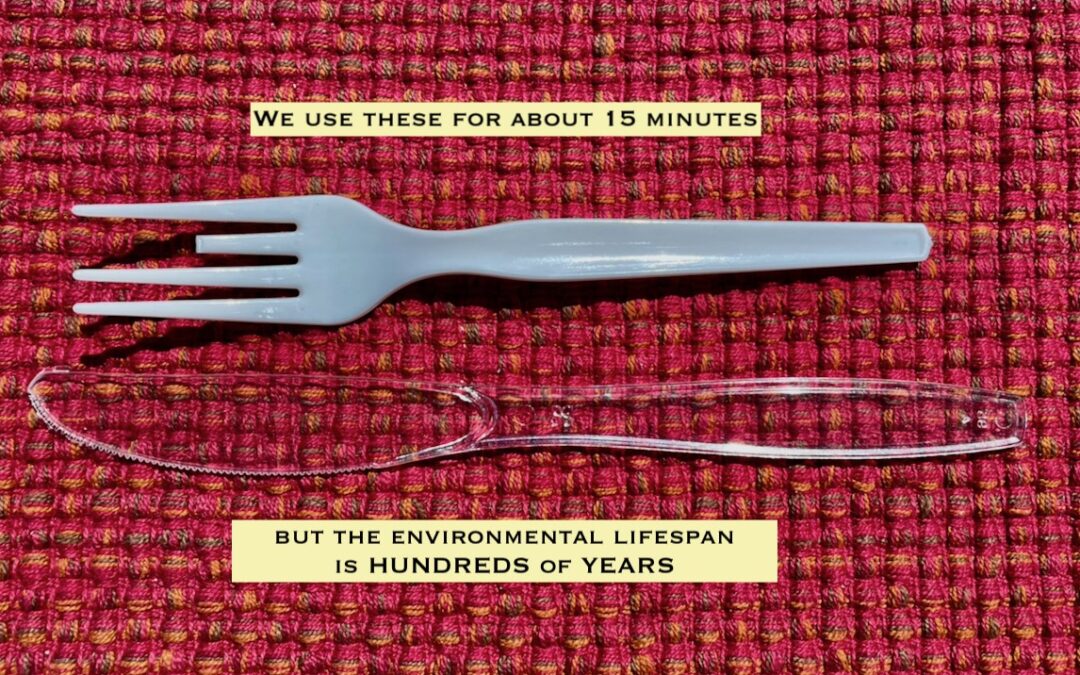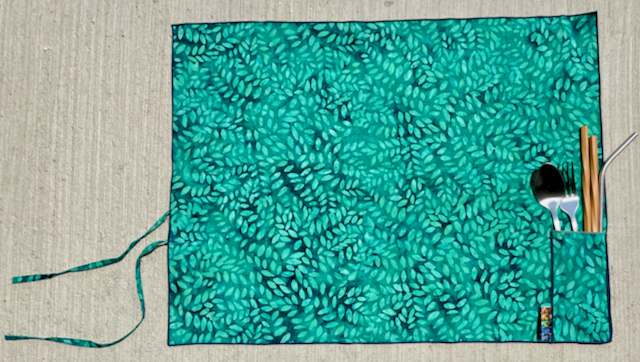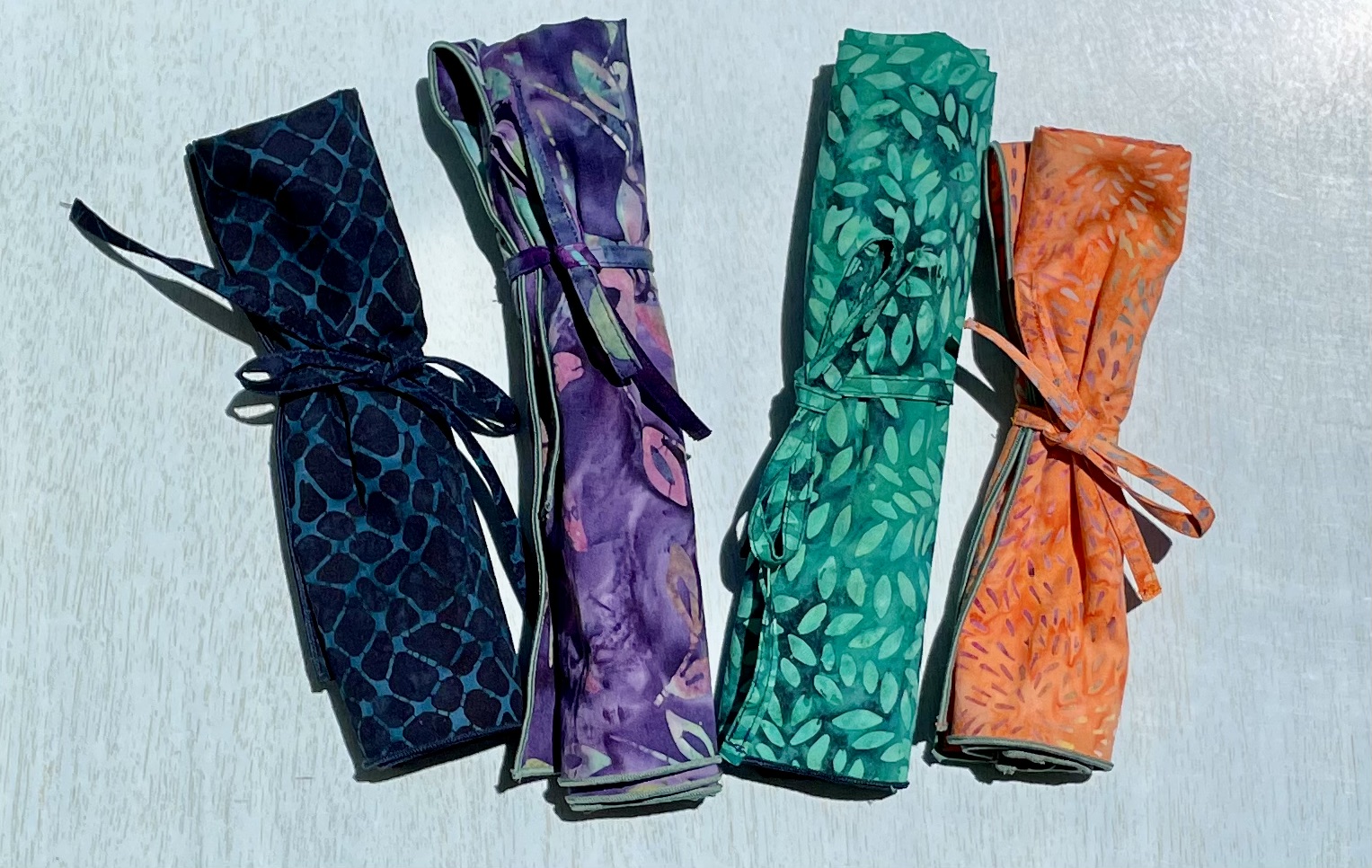To help get buy-in from family members, have each person select their own napkin and utensils so it is personal for them.
The last step is to decline the disposable items from businesses that provide them. Some businesses allow me to check a box if I don’t want utensils. Regardless, I type in “No utensils or napkins please” into any comment box available on my order. Some times I still receive them, so I gently remind them they aren’t needed. My wish is that the default option used is “no utensils included” instead of always including them.
Sometimes the only option is to use the available plastic utensils. No guilt. No judgment. Compostable and bamboo utensils are more environmentally friendly options, when available. However, what if carrying our own set of utensils became the new normal? If you feel inspired to stop using this type of plastic for the month of July, consider joining 100+ million people and sign up for the challenge at Plastic free July. Even encourage others to join you! Together we can do this.
Please share pictures of your utensils and napkins in use on the Earth Matters Now Facebook page. Each original photo of sustainable utensils in use in place of plastic will be entered into a drawing on July 31, 2023 for one of the eco-friendly products listed above!
Citations: 1Plastic Free July; 2Production, use, and fate of all plastics ever made; 3Micro plastics in food chain; 4Fact sheet: Single Use Plastics
This post contains affiliate links, which means I may receive a small commission, at no cost to you, if you make a purchase through a link. Affiliate links do not affect my recommendations or evaluations in any way. Thank you for supporting the work at Earth Matters Now.
Goal: Reduce reliance on disposable plastic utensils when eating out.
Estimated reading time: 6 minutes
Did you know that there is a global movement called Plastic Free July®1? One way to honor this plastic free month is to reduce usage of disposable, plastic utensils. Can you try it yourself for one month? If you feel inspired, encourage others to join you.
Disposable single-use utensils have a use lifespan of approximately 15 minutes, but an environmental lifespan of centuries. Think about the last time you used a plastic fork. Was it used just long enough to finish a piece of birthday cake or a lunch at a fast food stop? Minutes of use, but the utensil remains in our environment for 100’s of years!
“Virtually every piece of plastic that was ever made still exists in some shape or form (with a small amount that has been incinerated).”2 Sadly, plastic does not decompose. Instead it breaks down3. That is, it breaks down into small pieces and is then is ingested first by animals and fish and then by humans4.
If you are my age (62) or younger, you probably have no memory of life without plastic. (Although I do remember purchasing sodas in glass bottles and having to return them when finished.) Mass production using plastics began in the 1950’s and has grown almost exponentially since then. The recent pandemic increased the need/use of plastics since fear of germ/virus spread prevented us from sitting in restaurants so more take out was ordered.I am proposing the following as a practice to try this month…
Carry your own utensils in your purse and/or backpack. Maybe even put another set in your car. Keep a set in your desk at work. If you feel inclined, have extra sets available for friends you are meeting for a meal.
Free/low-cost ideas for utensils:
I personally prefer metal utensils as they are easier to wipe off after eating, but many people prefer bamboo or other types. I personally have two settings with a fork and spoon and one setting with a spork, which replaces both utensils. Other people might include a set of chopsticks and/or a reusable straw. The options to go plastic free are as creative as you want them to be.
- Use a fork and spoon from home
- Use utensils from camping gear
- Purchase metal utensils from a thrift store
- Reuse a bamboo set that you already have
- Reuse a plastic set that you already have
- Purchase camping utensils
- Purchase utensils from IKEA, Kohls, Target, etc.
Free/low-cost options for napkins and storage:
Years ago, I created a travel napkin that is made from tightly woven batik fabric. These napkins have a small pocket to insert the straight ends of utensils. The fabric folds over and you roll everything up and tie it off. The prints I’ve chosen hide stains and are easy to fold over the utensils.
Storing and access to your kit
Once you have everything gathered to your liking, the key step is to place the items in the places you will need and remember to use them. I have a set in in each of the following locations:
- Purse
- Backpack
- Briefcase
- Lunch bag
- Car glove box
- Office drawer

To help get buy-in from family members, have each person select their own napkin and utensils so it is personal for them.
The last step is to decline the disposable items from businesses that provide them. Some businesses allow me to check a box if I don’t want utensils. Regardless, I type in “No utensils or napkins please” into any comment box available on my order. Some times I still receive them, so I gently remind them they aren’t needed. My wish is that the default option used is “no utensils included” instead of always including them.
Sometimes the only option is to use the available plastic utensils. No guilt. No judgment. Compostable and bamboo utensils are more environmentally friendly options, when available. However, what if carrying our own set of utensils became the new normal? If you feel inspired to stop using this type of plastic for the month of July, consider joining 100+ million people and sign up for the challenge at Plastic free July. Even encourage others to join you! Together we can do this.
Please share pictures of your utensils and napkins in use on the Earth Matters Now Facebook page. Each original photo of sustainable utensils in use in place of plastic will be entered into a drawing on July 31, 2023 for one of the eco-friendly products listed above!
Citations: 1Plastic Free July; 2Production, use, and fate of all plastics ever made; 3Micro plastics in food chain; 4Fact sheet: Single Use Plastics
This post contains affiliate links, which means I may receive a small commission, at no cost to you, if you make a purchase through a link. Affiliate links do not affect my recommendations or evaluations in any way. Thank you for supporting the work at Earth Matters Now.



Congratulations on the launch of your blog. I am tucking a set of utensils and a reusable straw into my purse now. I look forward to the next post on easy ways to do my small part in healing the planet.